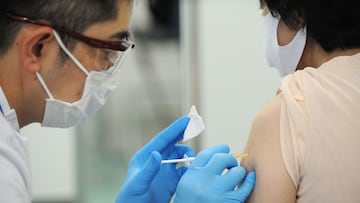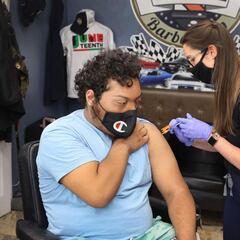When is it expected that all the US population will be vaccinated against covid-19?
The US looks likely to miss President Biden’s goal of at least 70% of Americans partially vaccinated by 4 July, reaching 100% may be more elusive.

President Biden announced a “National Month of Action” to encourage Americans to go out and get vaccinated in an effort to get at least on jab in 70 percent of the US adults by 4 July. However, a week into the drive toward his goal it appears that it won’t be met until late-July.
The US has partially vaccinated over 164 million adults 18 and older representing 63.8 percent of the population but vaccination rates continue to decline. The national seven-day running average was 815,344 as of 3 June, far below the small bump in vaccinations in May when the Pfizer-BioNtech covid-19 vaccine was authorized for emergency use in 12- to 15-year-olds, the only one so far for this age group.
Also see:
- What can you win in the Washington Vaccine Lottery?
- California to announce second round "Vax for the Win" Friday
- New York extends $5 million Vaccine Lottery
- Hawaii Governor sets goal for lifting travel restrictions on travelers from out of state
Vaccination rates began strong are now lagging
It has been just over six months since the first covid-19 was approved and now over 140 million American adults, just over 53 percent, have completed their vaccine schedules of either one dose of the Johnson & Johnson or two doses of either the Pfizer-BioNTech or Moderna covid-19 vaccines. The incredible speed of the vaccines' development and rollout has helped bring under control covid-19 in the US. But getting to this point came at a terrible cost as the nation approaches 600,000 deaths from the disease that was declared a pandemic 15 months ago.
At least 12 states have reached the 4 July goal of partially vaccinating at least 70 percent of their adult population but there remain pockets of low vaccination, especially in the South. The lowest overall vaccination rates in the US are Mississippi, Alabama and Louisiana with their neighbors not much further ahead. The highest vaccination rates are in the Northeast and Hawaii.
#Parents: Looking for a #COVID19 vaccine for your 12–15-year-old?
— CDC (@CDCgov) June 8, 2021
Check with your child’s doctor or your local pharmacy to see if they have vaccination appointments. You can also visit https://t.co/U6bZ3HQd3P to find vaccination providers near you: https://t.co/p4fdYarnsK. pic.twitter.com/w6W2u6JPIr
When promoting his push to get the US population to the lower-level of possible herd immunity President Biden noted this gap between parts of the nation “I don’t want to see the country that is already too divided become divided in a new way between places where people live free from fear of COVID and places where when the fall arrives and death and severe illnesses return.”
When will the US have its entire population vaccinated
Reaching 100 percent of the population fully vaccinated would never be achievable since there are groups of people who might not be able to get the covid-19 vaccine because of their immune system or are highly allergic. These are exactly the people, and others that are at elevated risk from getting covid-19, why getting the vast majority of the population vaccinated is so important. By getting vaccinated, people can stop the virus from spreading and keep themselves out of the hospital even if they get the disease after being vaccinated.
A new @CDCMMWR finds #COVID19 cases, emergency department visits, hospital admissions, & deaths declined more among older U.S. adults, which is likely due, in part, to higher #COVID19 vaccination coverage for this age group. Learn more: https://t.co/TowtRsCSdm. pic.twitter.com/IbVLykLd84
— CDC (@CDCgov) June 8, 2021
Related stories
At the current pace, the US could reach 70 percent of the population 12 and older vaccinated against covid-19 by sometime in October, this includes children which aren’t in President Biden’s goal. Reaching the upper-end of what health experts estimate for herd immunity at 90 percent of all US residents, again 12 and older, probably wouldn’t be achieved until March 2022, according CDC data analyzed by the New York Times.
The fear is that those pockets where people haven’t been vaccinated could be hit hard by the emerging variants. The Alpha variant is currently the dominant strain in the US but another more worrisome Delta variant, which has wreaked havoc in India and is causing concern in Europe, could gain traction in unvaccinated areas. Currently it represents roughly two percent of infections in the US according to CDC data. If allowed to spread unhindered, further mutations could breakthrough testing the efficacy of the covid-19 vaccines in use now.


